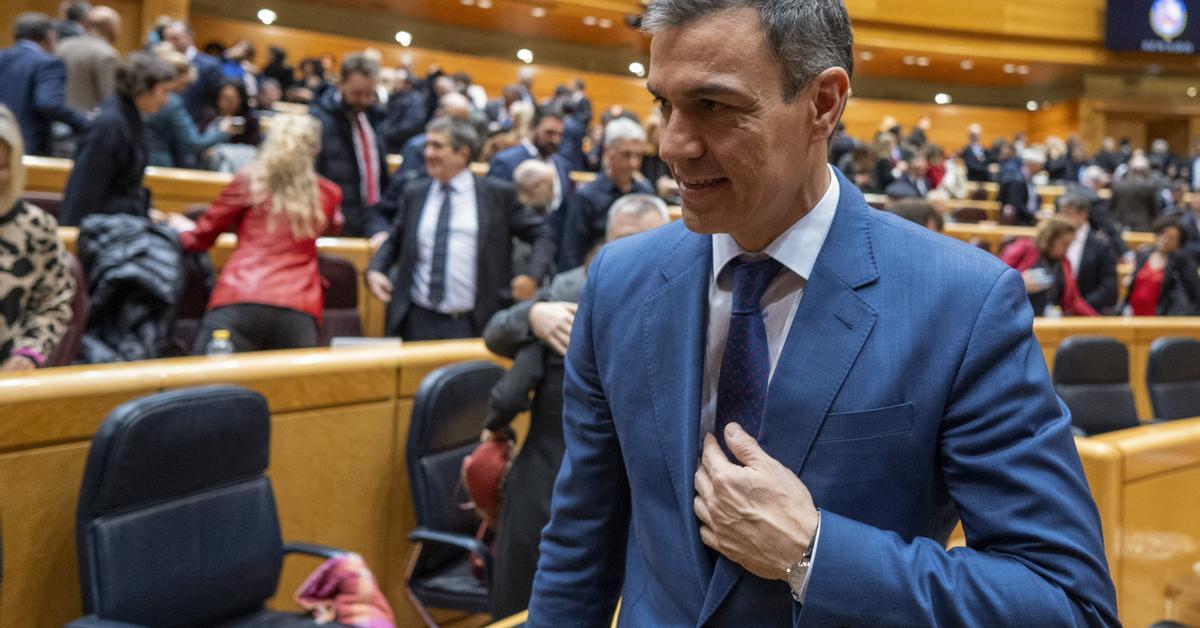
It is no longer amnesty. Nor the agonizing negotiation that preceded the approval of the powerful social package promoted by the Government. Nor did the V for Vendetta with which Podemos dealt a hard blow to Yolanda Díaz. Everything now revolves around the price paid for the Catalan independence movement to facilitate the approval of the decrees. In particular, the one that commits to delegate immigration powers to Catalonia and was agreed with Junts, a party that does not govern, but competes electorally with the Republicans, current regents of the Generalitat and partners of the socialists in Madrid. Just like the PNV, which is now demanding ‘what about me’ while the PP threatens to go to the Constitutional Court, asks Pedro Sánchez to rectify and not encourage xenophobic positions among his parliamentary allies.
Digestion of what happened last Wednesday in the Senate will not be easy, but the Government has set to work to stabilize the legislature, correct the work methodology, calm the discomfort of its allies and carry out a true balancing act with which satisfy the interests of all of them.
It will not be easy, but the socialists are already planning for the future after avoiding the danger that the first plenary session of the year would end with a severe parliamentary tumult and singing the ‘mea culpa’ for not having negotiated the decrees with sufficient advance notice, ignoring the times informative and let Puigdemont’s people impose a story that they are now trying to decaffeinate and bring to bear on European reality.
Despite the lack of specificity in the agreement that provides for the delegation of powers on immigration, the commotion has forced the first vice president, María Jesús Montero, and the Minister of the Presidency, Félix Bolaños, to struggle in the explanation with the rest of partners and also to kick the ball of what was agreed until it places it in the field of inconcretion and a horizon as distant as it is uncertain. And, in effect, everything depends on the drafting and subsequent processing of an organic law whose approval requires a majority of 176 deputies that the Government would not have in Congress to pass the text. Much less after the terrain in which Junts has placed the debate by presenting it in terms similar to those of the openly xenophobic ultra parties.
Since last Thursday, Bolaños and Montero have tried with their presence in various media to reduce the alarms encouraged by the right by remembering that whoever manages the powers in the matter, it is the European Union that dictates the immigration policy of its member countries. . “Neither Catalonia, nor Madrid, nor Spain. It is the European institutions that mark the path on which migration policy must follow. It is increasingly obligatory to comply with the EU guidelines, where there is an agreement that establishes the criteria of solidarity with the member states most affected by migratory flows,” says a PSOE minister who in any case believes that the Government has saved the ‘match point’ in a match in which the right wing expected “a resounding parliamentary defeat” for Sánchez.
Hence, from La Moncloa they try to transfer the debate not to what Puigdemont’s people say in the media but to what they finally do: “Five months ago, before the 23J campaign, they said that they would never vote for the investiture of a president of the Spanish Government because everything about Spain was foreign to them, and they have already voted for the presidency of Francina Armengol as the third authority of the State and that of Pedro Sánchez.”
Beyond the explanations that are given now but were not given at the time in which Junts made the agreement public, the real concern in Moncloa is to calm the discomfort of ERC, which not only raised its hands when it learned the content of what was agreed but immediately demanded explanations. Bolaños immediately contacted ERC and the Government – where there are also differences over what the strategy should be against a Junts that has stolen their focus and prominence in Madrid – to explain to them that what was agreed upon was little more than a declaration. of intentions. This was conveyed to the Minister of the Presidency, to whom she also told that it is only an announcement and that everything is in a “very embryonic phase.” Laura Vilagrá later criticized the agreement and stated that it is a “very diffuse pact” and that her party, which is about to graduate from negotiations with the PSOE, knows “how everything ends when the socialists use the verb to push.”
The details of the conversation between Bolaños and Vilagrá were revealed by ERC spokesperson Raquel Sans, but they coincide with those offered in recent hours by government sources who are convinced of having reassured the Republicans. They say the same about the leaders of the PNV, who demand equal treatment and identical powers as Catalonia, and to whom Bolaños also translated in the same terms the scope of the contents agreed with those of Puigdemont. The Minister of the Presidency met with the spokesman for Basque nationalism in Congress, Aitor Esteban, the same Wednesday in the Senate to reduce the tension that the negotiation with the neo-convergents caused in their ranks.
Nor have the winks that the first secretary of the PSC, Salvador Illa, publicly given in recent days to the Republicans and their sense of responsibility in any negotiation to distinguish them from the poor reliability and harshness of the forms of the Together.

Podemos and its evil relationship with Yolanda Díaz is another issue that poisons Sánchez’s dreams and, after the ‘no’ of the purples to the decree that improved coverage for the unemployed, the socialists have decided to take action on the matter after several attempts failed for the leader of Sumar to do her part to de-escalate the situation in that space on the left. From now on, it will be the PSOE ministers who, whatever the matter to be discussed in any parliamentary negotiation, will lead the dialogue with Ione Belarra’s party, which is already one more member of the parliamentary arc since it decided to leave Sumar and migrate to the Group. Mixed. “We will have to be the ones to save the furniture for the Minister of Labor, given her manifest inability to understand herself with the Podemos deputies and vice versa. The acrimony is such that even if Díaz presented a proposal to raise the SMI by 40%, the five purple deputies would vote against it,” ironically states another Government minister.
Sarcasm aside, what is an unappealable reality is that Yolanda Díaz has 26 deputies today and not 31 like when the legislature started. And that from now on the relationship with the five who left the group will be carried out exclusively by the PSOE to avoid new consequences of zero contact between both factions of the alternative left. Something that seems essential in a complex legislature, in which the Government has a slim majority where all votes are necessary every day and given Díaz’s conviction – which the PSOE believes is absolutely wrong – that an isolation strategy will kill before those of Pablo Iglesias.
So much for the hangover of a week in which the Sánchez Government was about to bite the bullet and, once again, saved the furniture. To celebrate – or digest it – the president took all the ministers to Quintos de Mora this weekend, where before arriving several ministers agreed on the reflection that “with Podemos out of the cabinet there is less internal noise, but the majority of the investiture runs more risks.”
Source: www.eldiario.es

